Mass Illness from Marijuana Edibles in San Francisco
There’s more potential for overdose from edibles than smoked marijuana, although the teen in Seattle who jumped to his death last December did it after smoking pot for the first time. Two shocking incidents in California suggest that overdose emergencies will increase if that states vote to legalize marijuana in November. Here’s a summary of recent cases of toxicity from edibles:
- 19 people were hospitalized in San Francisco on August 7 from THC, after attending a quinceañera party. The source is believed be marijuana-infused candies, perhaps gummy bears. Several children were among those poisoned, one as young as six. A 9-year-old had severe difficulty breathing.
- Pot brownies sent a bachelorette party to the emergency room in South Lake Tahoe over the weekend of July 30-31. Eight of the 10 women were admitted to the hospital according to the City of South Lake Tahoe’s website.
- A JAMA Pediatrics article explains the dramatic rise in children’s hospitalizations related to marijuana in Colorado since legalization. In 10 cases, the product was not in a child-resistant container; in 40 scenarios (34%) there was poor child supervision or product storage. Edible products were responsible for 51 (52% ) of exposures. The report claimed that child-resistant packaging has not been as effective in reducing kids’ unintended exposure to pot as hoped.
- The report mentions the death of one child, an 11-month-old baby. Nine of the children had symptoms so serious that they ended up in the intensive care unit of Colorado Children’s Hospital. Two children needed breathing tubes.

Hamza Warsame, 16, jumped 6 stories after smoking pot in Seattle in December. Photo: Seattle Times, from the Warsame Family - The state of Washington has a similar problem with edibles, as reported on the King County Health Department’s website. From 2013 to May 2015, there were 46 cases of children’s intoxications related to marijuana edibles reported in Washington. However, reporting is voluntary and the state estimates that number could be much higher.
- In May, a father plead guilty to deliberately giving his 4-year-old daughter marijuana-laced cake in Vancouver, Washington. He was sentenced to two years in prison.
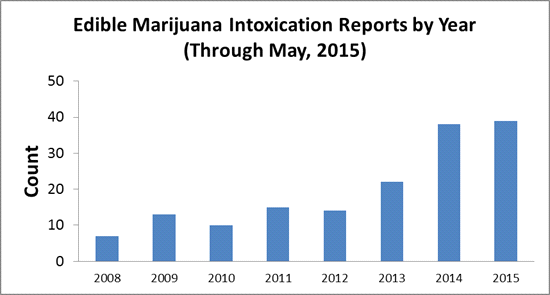
Intoxication from marijuana edibles has risen steadily since legalization. Source: King County Department of Health. Top photo: AP - In Hingham, MA, there was a 911 related to teen girl who ingested marijuana edibles. The candies were in a package labelled Conscious Creations, which didn’t disclose ingredients. Massachusetts has a medical marijuana program, but it is not clear how or to whom they were sold or dispensed.
- July, 2016: Two California teens were hospitalized after eating a marijuana-laced cookie. The teens reported purchasing the cookie from a third teenager who was subsequently arrested.
- July, 2016: A California man was arrested for giving candy laced with marijuana to a 6-year-old boy and an 8-year-old boy; the 6-year-old was hospitalized for marijuana poisoning.
- July, 2016: Police in Arizona arrested a mother for allegedly giving her 11- and 12-year-old children gummy candy infused with marijuana. Police say the marijuana-infused candy was originally purchased by an Arizona medical marijuana user, but was illegally transferred to the mother in question. (State medical marijuana programs have poor track records of assuring the “medicine” goes to whom it is intended.)
- On April 27, a Georgia woman was arrested after a 5- year-old said he ate a marijuana cake for breakfast. The child was taken to the hospital for treatment following the incident; according to officials, his pulse was measured at over 200 beats per minute.
- Last year there were more than 4,000 treatments at hospitals and poison center treatments in the US related to marijuana toxicity in children and teens.
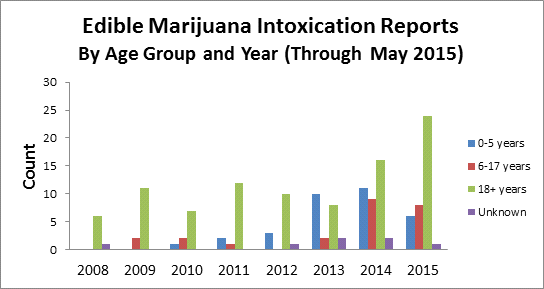
Growth of marijuana edibles intoxication by age. Source: King County, Washington
Edible marijuana poses a “unique problem,” because “no other drug is infused into a palatable and appetizing form” – such as cookies, brownies and candy. Many household items cause poisonings, but marijuana edibles are different because they’re made to look appealing and they appeal to children.

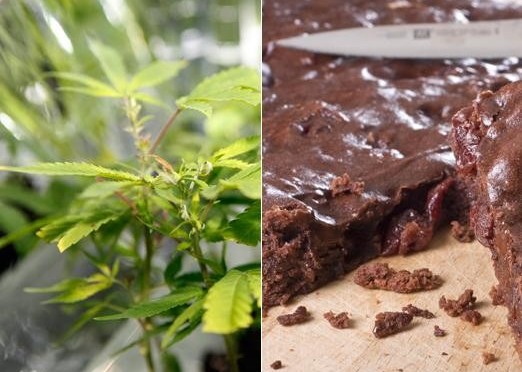
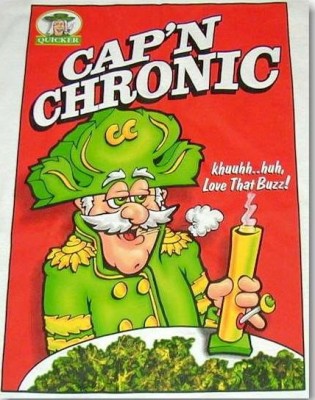
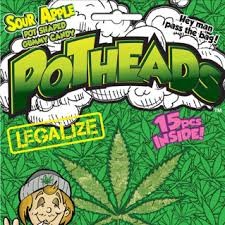
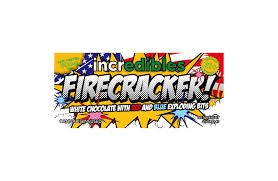
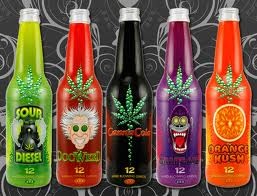
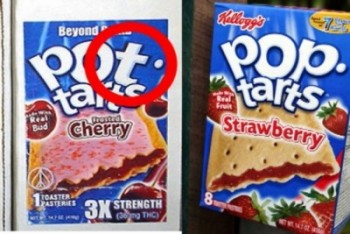
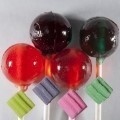 products which mimic the look of Hershey’s candies are: Ganja Joy, like Almond Joy; Hasheath, which looks like Heath Bars; Hashees which resemble Reese’s peanut cups, and Dabby Patty, made to look like York peppermint patties. The company’s website says its products “diabetic safe and delicious” and helpful with a variety of issues, including pain, headaches and insomnia.
products which mimic the look of Hershey’s candies are: Ganja Joy, like Almond Joy; Hasheath, which looks like Heath Bars; Hashees which resemble Reese’s peanut cups, and Dabby Patty, made to look like York peppermint patties. The company’s website says its products “diabetic safe and delicious” and helpful with a variety of issues, including pain, headaches and insomnia.